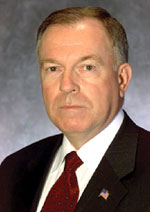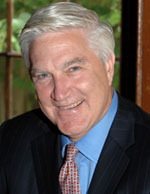HOMELAND SECURITY
Proximity Puts Virginia Ahead
Virginia has been one of the prime beneficiaries of the homeland security industry, which has developed largely in response to the 9-11 terrorist attacks. In the five- plus years subsequent to the attacks, the state has welcomed nearly
 |
| William Parrish, a former top Department of Homeland Security official, guides the homeland security program at Virginia Commonwealth University in Richmond. |
Keith Boswell, who oversees security industry recruiting for the Virginia Economic Development Partnership, says that while investment is spread around the state, significant clusters have developed in three areas: Northern Virginia, Hampton Roads and Richmond. /
Virginia Commonwealth University in Richmond created what are considered the first undergraduate majors in homeland security and emergency planning in 2004, hiring former U.S. Dept. of Homeland Security official William Parrish to develop the program. /
"I'm a firm believer we need to create a whole new profession in homeland security and emergency preparedness," Parrish tells Site Selection. "Not only in response to terrorism, but also in light of the magnitude of natural disasters." /
The program launched with strong student interest – more than 285 enrolled in Parrish's first Homeland Security 101 class last spring. Students are coming from a variety of disciplines such as business, medicine and engineering. /
"It's this generation's time, and they see a need to serve," Parrish says.
Classes cover topics from terrorism to emergency management, strategic planning and legal and constitutional issues. Parrish says strong support for the program from state and federal government has been important, providing credibility from the start. Private sector interest has been strong too, he says. /
"Several companies have come to me looking to develop internships," Parrish says. "They're basically looking to increase their hiring pool because this is a growth industry. They need to have people who can help explain to them what this whole thing of homeland security is about. The day after 9-11, a lot of people were pulled away from their jobs and given new duties with no training. This is a transformation taking place across every segment. /
"Virginia is ideally postured for this industry because of where we are, because we were a victim of 9-11 with the Pentagon on our soil, so we need to make sure we are prepared," he continues. "Private industry outside of the Beltway is critically important and is bringing a lot of opportunities to Northern Virginia." /
But Parrish believes Richmond has plenty to offer security technology firms since it is only 100 miles (62 km.) from Washington, D.C., its cost of living is cheaper than Northern Virginia and it has all of the necessary communication infrastructure in place. While federal dollars have been flowing into the sector for several years, money is becoming tight and firms must target their efforts to smaller contracts on the state, regional and local levels as opposed to huge federal contracts, he says. /
"State and local officials are learning quickly, but the whole concept of strategic planning for emergency preparedness is new. One of the keys is developing a hiring pool. I can hardly get through a lecture because my students are so engaging. I'm excited about what I'm seeing of the next generation." /
Parish says VCU has had preliminary discussions about development of a homeland security institute to help facilitate private industry technology development.
 |
| Tom McMillen |
While the states that ring the nation's capital, such as Virginia and Maryland, have proximity as an ally in their sector development, technology often arises where there is a need, Parrish says. He suggests that cities that are potential high- value targets for would- be terrorists are also ripe for homeland security development. He cites Chicago, Seattle, Denver and Atlanta as fertile areas because they have important infrastructure or may have been mentioned by terrorists. /
Former Maryland congressman and professional basketball player Tom McMillen now heads Homeland Security Capital, a consolidator company that acquires and develops emerging homeland security technology companies. /
"There are advantages to being near your nation's capital, but because a lot of procurement goes down to the local and municipal level, you can have a very robust business operating at the state level that doesn't necessarily require a presence in the Washington market," McMillen says. "A lot depends on the kind of business you have more than anything else. Maryland will do more in this area largely because the NSA [National Security Agency] is there." /
McMillen, whose firm searches for companies across the U.S. to acquire, says the industry's development mirrors the areas where the government is spending money: "Nuclear detection and the whole bio- terrorism area are big," he says. /
McMillen says Maryland's efforts are aided by the Chesapeake Innovation Center, the nation's first homeland security incubator in Anne Arundel County, and by the developing M Square technology park at the University of Maryland, which has a homeland security component. McMillen believes companies will cluster around each facility. /

